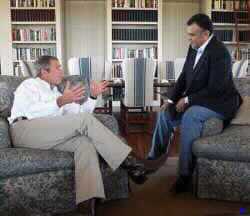HIGHLIGHTS: There's Definitely a War Premium, Otherwise Oil Prices Would be in Mid-twenties, Oil Expert||For How Long Can Washington Keep Consumer Gasoline Prices Flat is a Million Dollar Question||How Far Would OPEC Ministerial Council be Affected by War Talk When it Convenes to Review Oil Prices?-Another Vexing Question||A dlrs 40 Oil Barrel Could Severely Cause a Drain on Pocketbooks & Additional Woes for Some Already troubled U.S. Industries|| STORY: Oil experts say fear over war with Iraq has sent oil prices higher, but Saudi Arabia and its oil dominance may well determine whether a U.S. attack on Iraq will have worldwide impact on energy markets - and choke off a struggling U.S. economic recovery with higher fuel prices.
That's another reason the Bush administration has been soothing relations with the Saudi Kingdom, including the unusual visit by Saudi Arabia's ambassador, Prince Bandar bin Sultan, to President George W. Bush's ranch in Texas this week.
"There's definitely a war premium. ... If it weren't for this nervousness, (oil) prices would be in the mid-twenties," said John Lichtblau, chairman of the Petroleum Industry Research Foundation.
Instead, the price of benchmark West Texas crude soared past dlrs 30 a barrel last week as Bush renewed his verbal attacks on Iraqi President Saddam Hussein and Vice President Dick Cheney forcefully outlined the administration's case for ousting the Iraqi leader.
The price receded somewhat and stood at just under dlrs 29 a barrel Wednesday, still up about 60 percent since the beginning of the year. But traders still fretted not only about Mideast war prospects, but about what OPEC producers will do in September when they map out future production levels.
Despite the run-up in oil price, the increase has yet to be felt by consumers. Gasoline prices, despite strong demand, have increased only slightly, averaging dlrs 1.40 a gallon this week, 8.5 cents cheaper than a year ago, said the Energy Department's Energy Information Administration.
"Gas prices have been surprisingly flat," says EIA analyst Doug MacIntyre. He also said heating oil inventories are adequate, but that could change as demand rises and supplies tighten.
The Organization of Petroleum Exporting Countries had been expected to boost production at its meeting next month, but recent statements by some of the oil ministers now indicate they may not, despite predictions of increased demand later this year. The war talk about Iraq also could influence them, some analysts suggested.
It is not Iraq's oil that worries the markets. Despite its huge reserves, Iraq's production has plummeted because of U.N. sanctions and internal oil infrastructure problems.
U.S. imports of Iraqi crude have fallen from more than 1 million barrels a day earlier this year to a mere 137,000 barrels a day last month as U.S. oil companies slashed their Iraqi purchases because of concern over future supply and frustration over burdensome purchase and pricing procedures.
As a result, Iraqi supplies are no longer viewed as pivotal, analysts said.
"We've seen Iraqi supplies shut down completely this year for a month and you didn't have any dramatic swings," said John Felmy, chief economist for the American Petroleum Institute, the industry trade group. "There's excess capacity throughout OPEC and non-OPEC countries."
But will that excess oil be made available should fighting erupt?
Saudi Arabia is the world's biggest oil producer its officials - as well as Kuwait - have tried to reassure the markets that despite their opposition to a U.S. attack on Iraq, they remain prepared to replace any lost Iraqi supplies and take action to stabilize oil markets.
"The Saudis have a long standing policy, which we have seen carried out in action in addition to rhetoric, about not using oil as a weapon," White House spokesman Ari Fleischer said after Bandar's visit to Bush's ranch.
But some analysts, and some Arab leaders, fear that an attack on Iraq could cause such chaos in the Middle East that internal political pressures might force Saudi officials - and other major Arab producers - to rethink their oil policies.
Daniel Yergen, chairman of Cambridge Energy Research Associates, says an attack on Iraq and cutoff of its supplies could cause prices to spike to dlrs 35 to dlrs 40 a barrel. He predicts prices would retreat once buyers are assured that supplies from other countries are not disrupted.
During the 1990-91 Gulf War oil prices spiked to dlrs 41 a barrel, but receded when it became clear Saudi fields were not threatened.
"The real problem would be if other Gulf suppliers were affected by the conflict," Yergen wrote recently in an op-ed article in The New York Times. "Then prices could climb far higher. From an oil point of view that is the big risk."
The impact of dlrs 40 a barrel oil on the global economy is likely to be severe and threaten an already struggling U.S.
economic recovery with higher gasoline prices, more expensive heating oil and jet fuel, causing a drain on pocketbooks and additional woes for already troubled industries such as the airlines and automakers, economists say.
Should supplies be seriously disrupted, energy experts say, oil consuming nations would likely draw on the more than 1.2 billion barrels of emergency oil stocks, including more than 600 million barrels currently in the U.S. Strategic Petroleum Reserve.
PHOTO CAPTION
President George W. Bush(L) meets with Saudi Arabian ambassador Prince Bandar bin Sultan at the Bush Ranch in Crawford, Texas, August 27, 2002. Bush pledged to consult with Saudi Arabia and other countries as he approaches a decision on whether to attack Iraq, the White House said. (The White House via Reuters)
- Author:
& News Agencies - Section:
WORLD HEADLINES


 Home
Home Discover Islam
Discover Islam Quran Recitations
Quran Recitations Lectures
Lectures
 Fatwa
Fatwa Articles
Articles Fiqh
Fiqh E-Books
E-Books Boys & Girls
Boys & Girls  Hajj Rulings
Hajj Rulings Hajj Fatwas
Hajj Fatwas














